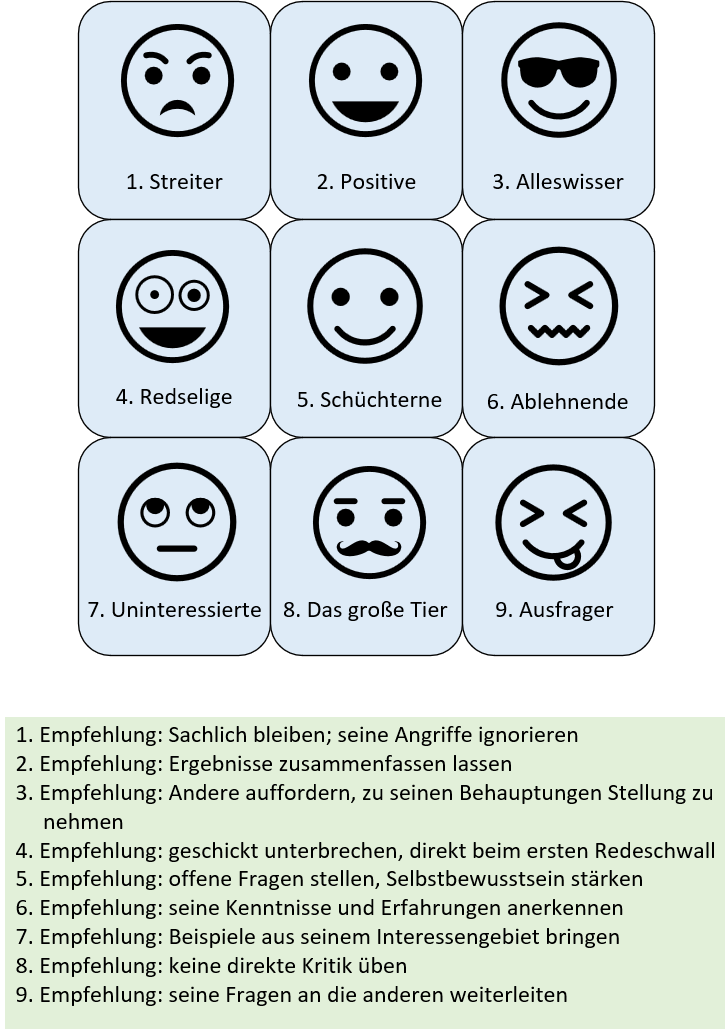Participant Types
What types of participants are there and how do you deal with them?

In a seminar there are people with different characteristics, personalities and values. This makes each seminar an individual experience for the trainer, but of course also represents a challenge. The seminar leader must be able to deal with all participants equally well so that they feel taken seriously and appreciated and actively help shape the seminar.
With the help of the following typification of participants, recommendations for action for frequently occurring situations in the seminar can be determined. It should be noted here that a participant cannot usually be explicitly assigned to a participant type for the entire duration of a seminar.

1. The Fighter
The quarrel likes to provoke and tries to upset the seminar leader and/or the participants. He will not leave any situation unused, start a discussion and embarrass his counterpart in front of everyone.
In such situations, the seminar leader should react calmly, not allow himself to be provoked and ignore such attacks.
2. The Positive
The positive is an asset to the seminar. He can get something positive out of everything and everyone and will take an active part in the seminar.
The leader of the seminar should give the positives a chance to speak more often and have the results summarized so that his charisma is transferred to the other participants.
3. The Know-It-All
The know-it-all will do everything to be the center of attention and to represent his or her opinion. For him, only his opinion is correct. This can significantly disrupt the course of the seminar.
The seminar leader should ask the other seminar participants to comment on the claims of the know-it-all so that the situation is defused and the know-it-all realizes that there are other opinions and participants.
4. The Talkative
The talkative will not have much to say on the subject at hand, but will still talk a lot. He wants to be the center of attention and be heard by the other participants. It can also happen that he interrupts the other participants.
The leader of the seminar should skilfully interrupt the talkative person at the first burst of speech in order to avoid disrupting the course of the seminar.
5. The Shy One
The shy person will not actively participate in the course of the seminar. Even if he knew the correct answer to questions, he would let the others answer the question.
The facilitator should boost the shy person's self-confidence by asking open-ended questions so that the shy person is challenged to reveal their own opinions and perspectives.
6. The Rejecting One
The refusal will boycott the course of the seminar. He will also not actively participate in the seminar. As a rule, such types of participants are people who have many years of professional experience and cannot imagine at the beginning of the seminar that they will gain anything positive from it.
The facilitator should recognize the knowledge and experience of the rejector to prevent the rejector from disrupting the course of the seminar with his strict rejection.
7. The Uninterested
Nothing matters to the uninterested. As a rule, he will not have booked the seminar voluntarily either. He will try to "serve out" his time in the seminar without really participating.
The leader of the seminar should try to introduce examples into the course of the seminar that correspond to the area of interest of the uninterested person. This encourages active participation.
8. The Big Boss
The big animals are usually superiors of other participants.
The seminar leader should not criticize a large animal directly, otherwise he runs the risk of it feeling attacked. By trying to discuss with the seminar leader, he could disrupt the entire course of the seminar. In addition, it can happen that the big animal questions the knowledge and skills of the seminar leader in front of everyone and portrays him as incompetent.
9. The Questioner
The questioner asks questions about every aspect, no matter how insignificant, that do not contribute to the progress of the group.
The facilitator should forward the questioner's questions directly to the seminar participants. This prevents the seminar from being conducted only between the questioner and the seminar leader. By including the other participants, not only can their more active participation be promoted, but the questioning of the participant can also be reduced.